七年级预备课程Lesson7课件
七年级预备教材 (7)
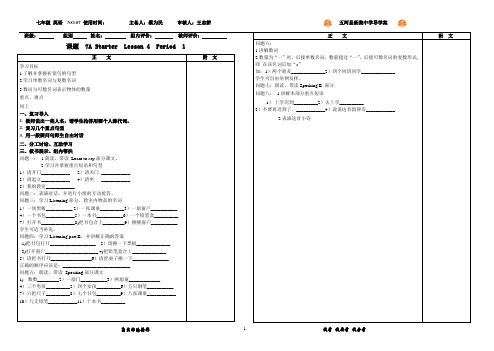
问题三:学习Listening部分,教室内物品的名词
1)一块黑板___________ 2)一张课桌__________3)一扇窗户___________
4)一个书包____________5)一本书___________6)一个铅笔盒__________
7)打开书______________8)把书包合上_________9)擦擦窗户___________
班级:组别姓名:组内评价:教师评价:
课题7A Starter Lesson 4 Period 1
正文
附文
学习目标
1.了解并掌握祈使句的句型
2பைடு நூலகம்学习单数名词与复数名词
3.数词与可数名词表示物体的数量
重点、难点
同上
一、复习导入
1.教师说出一些人名,请学生抢答用哪个人称代词。
2.复习几个重点句型
3.用一般疑问句师生自由对话
二、分工讨论、互助学习
三、板书展示、组内帮扶
问题一:1.朗读、带读Leant to say部分课文。
2.学习并掌握重点短语和句型
1)请开门____________ 2)请关门____________
3)请起立____________ 4)请坐____________
5)我的教室____________
正确的顺序应该是:____________________________
问题五:朗读、带读Speaking部分课文
1)数数_________2)一扇门___________3)两扇窗_____________
4)三个男孩__________5)四个女孩__________6)五只钢笔___________
Lesson 7新教材七年级下课件

I’m making a joke.
make a joke 开玩笑;讲笑话
e.g. It’s an important question. Don’t make a joke! 这是一个重要的问题。不要开玩笑!
joke 的基本意思是“笑话, 玩笑”, 指
引人发笑的谈话或故事, 也指供人当作
笑料的事情。可用作可数名词, 也可用 作不可数名词。joke 作“可笑的人、 事物、情形”解时, 多用于单数形式, 可与不定冠词连用。
Let’s go to the library and work on our projects. work on 从事于……; 努力改善或完成 e.g. Does she work on the farm? 她在农场工作吗? We should work on improving our school life. 我们应该努力改进我们的学校生活。
她虽然觉得身体不舒服,但仍然去上学。
The room was still at the end of the speech. 演讲结束的时候,房间里寂静无声。
The still water of the lake looks like a mirror. 静静的湖水像一面镜子。
joke n. & v. (开)玩笑
1. What is Danny’s project about? His project is about some places of interest in China.
2. What is Danny’s joke?
Danny can’t believe it — they don’t
have donuts on the Silk Road.
牛津英语七年级预备课程Unit7

牛津英语七年级预备课程Unit7 Colours一.教学内容词汇:mum, shirt, colour, white, coat, orange, these, dad, black, trousers, shoe, green, brown, cap, red, T-shirt,blue, jeans, yellow, blouse, pink, sweater, grey, skirt, whose, bike, basketball, his, our, kite, their, car, cold, thanks, take, her, bed, dress, racket, teddy bear, stick句型:What's in the box? It's a shirt. What colour is it? It's white. What are these? They're Dad's black trousers. What colour are they? They're green. Whose bike is it? It's my bike. Here's your coat. Here it is.二.教学目标与要求1. 掌握四会词汇和句型。
2. 学会对颜色进行提问。
3. 掌握形容词性物主代词的用法。
4. 复习一般疑问句以及肯否定回答。
5. 正确辨认元音字母在单词中的发音。
三.教学步骤Step1 Revision1. 默写上单元的单词。
2. 口头翻译句子。
Step2 Presentation课堂上利用粉笔复习询问颜色的句型和颜色词语。
如:拿一白粉笔问What colour is it? It's white.一类似的方法复习其它颜色词语orange, black, green, brown, red, blue, yellow, pink, grey,接着利用学生所穿的衣物询问颜色,练习到一定的程度可以引出句型Whose coat is it?It's my/his/ your/her/.....coat.讲解形容词性物主代词的用法。
预备Lesson7C课件

1. What time do you get up?
At six forty.
2. Does Nick play basketball in the afternoon?
Yes, he does.
3. Does Nick do his homework at seven?
No, he doesn't.
4. What time does Nick go to bed?
At nine twenty.
Read the dialogue gets ____ up at six forty in the Nick ____ morning. He often plays ____ basketball _____ at four o'clock in the afternoon. He often _____ ______ at half past six in the does homework evening. He often goes _____ _____ to _____at bed nine twenty in the evening.
6
What time do you go to school? I go to school at...
What time do you get up every day? What time do you have lunch? What time do you do your homework?
-What time do you get up in the morning? -I get up at six.
What time is it ? It's six fifteen. breakfast It's time for ...
预备教材Lesson 7 Enjoy our days课件(共21张PPT)
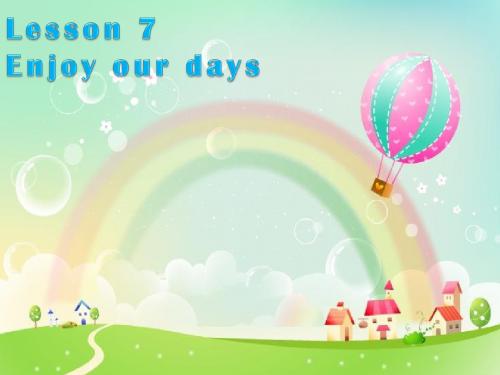
at + clock time
on + days of the week on + dates on + special days
in + months and seasons
in + years
rd May. 1. I was born ____ in 1998. My birthday is ____ 3on 2. We always fly kites in the park ______ Sundays. 3. Our new term starts _____ September. on 4. My mother is not at home. She will come back ____ 3 p.m. in 5. What will you do ______ May Day? I will help my parentsat clean the house. 6. These birds fly to the on north _____ spring and come back to the south ____ autumn. in in
1. _____ in autumn
_____
in January
on Saturday 2. _____
_____
on Sunday
3. _____ at 9.30
_____
at night
Dear Tony, How are you? Let me tell you about my school days. I get up early in the morning and walk to school every day. Our classes begin at eight. We have Chinese, Maths and English every day. On Monday and Wednesday, we have Science and PE lessons. We have Art lessons on Tuesday and Music lessons on Thurday. I love Friday because we have Computer lessons that day! We do not go to school on Saturday or Sunday. What subjects do you study at school? Are they easy or difficult for you? Please write back. Love Nick
冀教版七年级下册第七课课件PPT
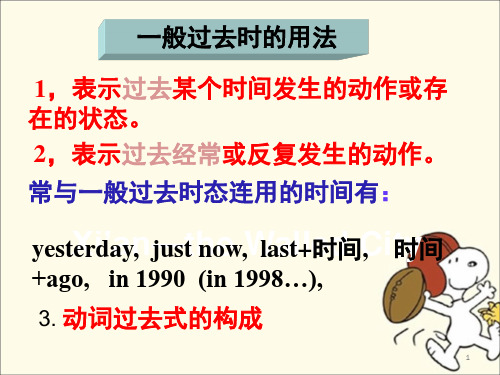
eg. Can you find the book anywhere? I have seen it somewhere. I’ve looked for my wallet
everywhere, but I can’t find it.
Some people are going nowhere. 一些人无处可去。
Words and expressions
project n. 课题;计划 interest n. 兴趣
still adv. 还,仍旧
Xi’an—atdhj.e不W动a的ll;e静d 止C的ity
anywhere adv. 任何地方;无论何处 joke n. & v. (开)玩笑
Phrases
• 1. talk about 谈论 • 2. have a good rest 好好休息一
WXe ih’aadnfu—n inthGeuiliWn laastllweedek.City
We did not have fun in Guilin last week.
Did you have fun in Guilin last week.
be 动词的过去时:
肯定句 主语 + be动词的过去式(was, were) 否定句 ~ .
translate…into…把……翻译成…… translator (n.) 翻译家 translation (n.) 翻译
eg. Can you translate the English
instructions into Chinese?
实义动词的过去时:
肯定句 主语 + 动词的过去式 ~ . 否定句 主语 + did not + 动词原形 ~ 疑问句 .Did + 主语 + 动词原形 ~ ?
七年级日语第七课的知识点ppt
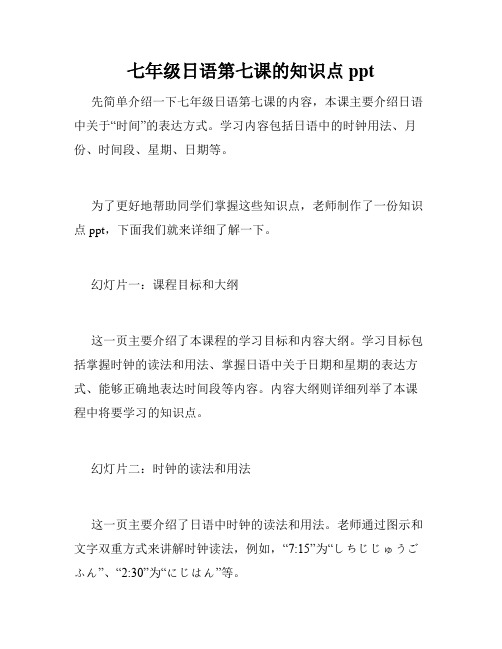
七年级日语第七课的知识点ppt 先简单介绍一下七年级日语第七课的内容,本课主要介绍日语中关于“时间”的表达方式。
学习内容包括日语中的时钟用法、月份、时间段、星期、日期等。
为了更好地帮助同学们掌握这些知识点,老师制作了一份知识点ppt,下面我们就来详细了解一下。
幻灯片一:课程目标和大纲这一页主要介绍了本课程的学习目标和内容大纲。
学习目标包括掌握时钟的读法和用法、掌握日语中关于日期和星期的表达方式、能够正确地表达时间段等内容。
内容大纲则详细列举了本课程中将要学习的知识点。
幻灯片二:时钟的读法和用法这一页主要介绍了日语中时钟的读法和用法。
老师通过图示和文字双重方式来讲解时钟读法,例如,“7:15”为“しちじじゅうごふん”、“2:30”为“にじはん”等。
同时,本页还介绍了时钟的用法,例如用于表示下午、晚上等时间段,以及常用时间短语的表达方式。
幻灯片三:月份和日期的表达方式这一页主要介绍了日语中月份和日期的表达方式。
通过图示和文字,老师讲解了日语中1月到12月的读法及写法,以及日期的表达方法,例如“9月10日”为“くがつとおか”、“12月25日”为“じゅうにがつにじゅうごにち”等。
同时,本页还介绍了指定日期的方式,例如“今天”、“明天”、“昨天”等。
幻灯片四:星期的表达方式这一页主要介绍了日语中星期的表达方式。
通过图示和文字,老师讲解了星期一至星期日的读法及写法,以及常用的星期短语表达方式,例如“今天是星期几?”等。
幻灯片五:时间段的表达方式这一页主要介绍了日语中时间段的表达方式。
通过图示和文字,老师讲解了常用时间段的读法和表达方式,例如“上午”、“下午”、“晚上”等。
同时,本页还介绍了用于表示始终、持续时间的词语,例如“一直”、“半个小时”等。
幻灯片六:练习题这一页主要是对前面所学知识点的练习。
老师准备了一些难度适宜的练习题,例如填写缺失的日期、时间段或星期,以及根据图片猜测时间等。
同学们可以通过这些练习提高日语的听、说、读、写能力。
译林版初一英语7A预备课程Lesson7 课件

1.___A_____ writes this e-mail? A Nick B. Tommy
2. This e-mail is about_B__. A. a school B. school days 3. Nick__B___ to school every day. A. runs B. walks
I go to school on foot every day II ggeett uupp eeaarrllyy iinn tthhee mmoorrnniinngg.and walk to school every day.
Monday to Friday (school days) have lessons
上一节数学课
我们在星期二有一节数学课。
We have a Maths lesson on Tuesday.
它对我来说很难。
It is difficult for me.
上一节英语课
have an English lesson
我们每天都有一节英语课
We have an English lesson every day.
5.We don’t go to school on Sunday.(T)
Mon. Tue. Wed. Thur. Fri. Chinese, _E_n_g_li_s_h_, Maths
Science __A_r_t_l_e_ss_o_n_s_____
Music _C_o_m_p_u_t_e_r_l_e_s_so_n__s ___P_E___________
Saturday and Sunday (weekdend)
What time do your first classes begin? Our first classes begin aattetwigehntttywpeasnttey.ight
新目标人教版初中英语七年级上册《预备篇》课件

Introducing the "th" sound. This case includes examples of words that use the "th" sound, such as "think" and "thank", and focuses on helping students correctly pronounce this difficult sound.
Sound-spelling correspondence
Teach students the sound-spelling correspondence, i.e., how sounds are represented by specific spellings.
03
Listening practice
New Target People's Education Press Junior High Sc
• Course Introduction • Analysis of preparatory
content • Teaching methods and
techniques • Teaching case analysis • Summary and Outlook
The significance of the preparatory section
The preparatory section is designed to help students transition smoothly from the old curriculum standards to the new ones, ensuring that they are fully prepared for the challenges ahead.
翼教七年级下册Lesson7课件

Lesson 7 What’s Your Project about?
New words
project interest still
anywhere joke
/ˈprɒdʒekt/ n. 课题;计划
/'ɪntrəst/ n. 兴趣
/stɪl/
adv. 还,仍旧
I looked for it everywhere . 我到处找了它。
7.Let's go to the library and work on our projects.
让我们去图书馆忙我们的课题吧。
work on “ 从事于;忙于”后接名词,代词,动名 词做宾语。
work on 还表示“继续工作”
Read the lesson and answer the questions.
1. What is Danny’s project about?
Some places of interest in China.
2. What is Danny’s joke?
They don’t have donuts on the Silk Road.
他正忙于写作业。 eg:He is on doing homework. 一个短暂的休息之后,我们又继续工作了。
eg: After a short rest___w__e_w_o_r_k_e_d_o_n_a_g_a_in_.,
8.A joke is something funny you say to make people laugh. ①joke用作名词,意为“玩笑”,
be/get ready to do sth. 表示“准备好做某 事,乐意做某事”。
新版预备教材lesson7课件
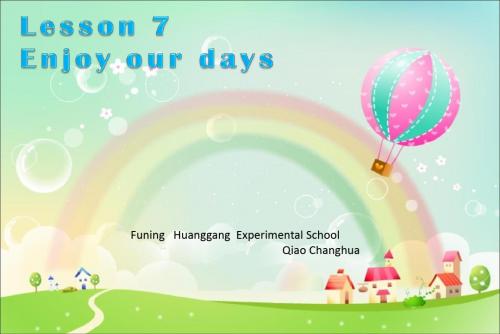
• 6.in+月份/年/季节,in January,in 1998,in winter
• 7.like doing sth.喜欢做某事,She likes drawing.
• 8.fly kites放风筝, He likes flying kites in spring.
• 9.in the open air在户外 • we like playing in the open air. • 10.have a long holiday 有一个长假 • They have a long holiday. • 11.what time..几点,什么时间,问具体时刻。 • What time is it now?现在几点了?It‘s nine.九点when 什么
How many seasons are there in a year?
spring
summer
autumn
winter
LOOK at the people in the pictures.
• How do they feel in autumn ? • They feel cool in autumn. • How do they feel in winter? • They feel cold in winter. • How do they feel in spring? • They feel warm and windy in spring. • How do they feel in summer? • They feel hot in summer.
• tell sb. about sth. 告诉某人关于某事。Can you tell me about your family?
牛津版初中英语七年级上预备单元Unit-7-ColoursPPT课件

A:Whose T-shirt is it?
B:It’s Tom’s T-shirt.
It’s his T-shirt.
-
31
A:What’s this?
B:It’s a cap.
A:What colour is it?
B:It’s red.It’s a red cap.
A:Is it your cap?
It’s __h_e_r___ skirt.
-
34
A:What are these? B:They are jeans. A:What colour are they? B:They are blue. They are blue jeans. A:Are they your jeans? B:No,they’re not my jeans.
A:W__h_o_s_e_ jeans are they?
B:They’re Peter’s jeans.
They’re __h_i_s___ jeans.
-
35
A:What’s this? B:It’s a dress. A:What colour is the dress? B:It’s blue.It’s a blue dress. A:Is it your dress? B:No,it’s not my dress. A:_________ dress is it?
-
33
A:What’s this? B:It’s a skirt. A:What colour is it? B:It’s blue. It’s a blue skirt. A:Is it your skirt? B:No,it’s not my skirt. A:_W_h__o_s_e skirt is it? B:It’s May’s skirt .
七年级预备课程Lesson7课件

afternoon 下午
5
6
科学 Science Chinese 语文 ME 思品 Art 美术
What subjects do you study at school ?
subject 学科
Music lessons
Computer lessons
Read and answer questions
at + clock time
What do you often do after school?
play basketball
do homework
watch TV play football
What do you do at 10:00? I go to bed.
B1:
in + months and seasons
What day is it today?
• It’s … • • • • • • Monday Tuesday Wednesday Thursday Friday Saturday Sunday
the first day
关于星期要注意
• 1n Sunday.
Are they easy or difficult for you?
• easy [‘i:zɪ] 容易的 • difficult [‘dɪfɪkəlt]
困难的
What subjects do you study at school?
学科,科目
再别康桥 ----徐志摩
a Chinese lesson
Exercises
• • • • • • • • • 告诉某人关于某事 我在学校的日子 早起 步行去学校 在八点开始 上美术课 在星期四 在学校 回信
演示文稿冀教版七年级下册第七课课件
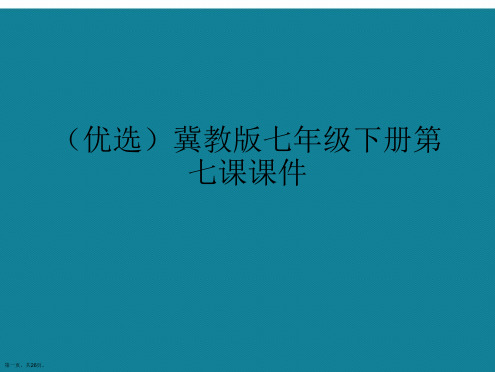
Phrases
• 1. talk about 谈论 • 2. have a good rest 好好休息一
下
• 3.Xtwi’oanfu—ll dthayes W整a整ll两ed天City
• 4. place of interest 名胜古迹
第五页,共26页。
• 4. make a joke 开个玩笑
C. talk with
D. to talk with
8. We didn’t go __A_ yesterday.
A. anywhere
B. everywhere
XCi.’saomne—whtehree WaDll.eandythCinigty
9. —What’s the film ___B_?
—The Hero Yue Fei.
• 5. work on 从事于,忙于
Xi’an—the Walled City
第六页,共26页。
Jenny's project:
Marco Polo and the Silk Road
第七页,共26页。
Danny's project:
Places of interest in China
第八页,共26页。
第十五页,共26页。
7. Can you translate any jokes into English ?
translate…into…把……翻译成…… translator (n.) 翻译家 translation (n.) 翻译
eg. Can you translate the English instructions into Chinese?
A. onto B. about C. along D. after
- 1、下载文档前请自行甄别文档内容的完整性,平台不提供额外的编辑、内容补充、找答案等附加服务。
- 2、"仅部分预览"的文档,不可在线预览部分如存在完整性等问题,可反馈申请退款(可完整预览的文档不适用该条件!)。
- 3、如文档侵犯您的权益,请联系客服反馈,我们会尽快为您处理(人工客服工作时间:9:00-18:30)。
February. It is cold and it sometimes snows.
It is warm and windy in spring. People like flying
kites on Saturday or Sunday in the open air.
It is hot in summer. Students do not go to school in
语文,汉语;中国人
We have a Chinese lesson on Monday.
星期一我们有一节语文课。
It’s easy for me.语文对我来说很容易。
a Maths lesson
数学
We have a Maths lesson on Tuesday. It’s difficult for me.数学对我来说很难。
• 3. Does Nick do his homework at seven?
No, he doesn't.
• 4. What time does Nick go to bed?
At nine twenty.
an English lesson
We have English lessons every day. 我们每天都有英语课。
a PE lesson
体育(课) We all like PE. 我们都喜欢体育课。
a Computer lesson
a Music lesson
an Art lesson
2.How does Nick go to school every day?
On foot.
3.When do his classes begin?
At eight.
4.What subjects do they have every day?
Chinese, English, Maths lessons.
We have _______A__rt__ lessons __o_n__ Tuesday and Music l_e_s_so__n_s___ __o_n___ Thursday.
你在学校学习什么科目?
What ____su_b_j_e_cts______d_o_ you study _a_t__ school?
美A术rt
What subjects do you study at school ?
subject 学科
Music lessons
Computer lessons
Read and answer questions
• 1. How does Nick go to school?
He walks to school.
F
• 3. He has English lessons every day. T
• 4. Nick loves MFroinddaayy.
F
Read and complete
Mon. Tue. Wed. Thur. Fri. Chinese, _E_n_g_li_sh__, Maths Science _A_r_t_l_e_s_so__n_s_____ Music _C_o_m__p_u_t_e_r_l_e_ss_o_n_s _P_E_____________
What day is it today?
• It’s … •
Monday Tuesday
•
Wednesday
•
Thursday
•
Friday
•
Saturday
•
Sunday
the first day
关于星期要注意
• 1.任何时候首字母要大写。 • 2.前面介词要用on. • 例:在星期天 on Sunday.
• 2. What time does Nick have classes?
At eight.
• 3. When does he have Computer lessons?
On Friday.
• 4. What subjects does he have on Wednesday?
Chinese, English, Maths and PE lessons.
July and August. They have a long holiday.
PartC:
• 1. What time do you get up?
At six forty.
• 2. Does Nick play basketball in the afternoon?
Yes, he does.
• 告诉某人关于某事 • 我在学校的日子
tell sb about sth my school days
• 早起 • 步行去学校
get up early walk to school
• 在八点开始
begin at eight
• 上美术课
have Art lessons
• 在星期四
on Thursday
• 5. What subjects does he have on Tuesday?
Chinese, English, Maths and Art lessons.
Read and answer questions
1.Who writes the letter to Tony?
Nick does.
January February March
April
May
June
July
August September October November December
How many seasons are there in a year?
spring
summer
autumn
winter
What subjects do you study at school?
=go to school on foot
上语文课(3种) have Chinese
=have a Chinese lesson
=have Chinese lessons
在星期一和星期三 on Monday and Wednesday
在星期六和星期天 on Saturday and Sunday
Exercises
Lesson 7 Enjoy our days
亲爱的 dear 一天 day 起床 get up 早的 early 步行 walk 开始 begin 语文 Chinese 数学 maths 星期一 Monday
星期三 Wednesday
科学 science
体育课 PE
课
lesson
星期二 Tuesday
that day. 3.我们的课八点开始。(2种方法) Our _c_l_a_s_se_s___ begin ___a_t_______ eight. =We __b__e_g_in__classes __a_t____eight.
5.我们每天上语文、数学和英语课。 We have Chinese, Maths_a_n_d English __e_v_er_y_d_a_y. 我们周二上美术课,周四上音乐课。
It's time for .b..reakfast .
9
3
-What time do you have
6
breakfast?
-I have breakfast at six
fifteen.
What time do you go to school? I go to school at...
What time do you get up every day? What time do you have lunch? What time do you do your homework?
w星e期ek su科b目jects
课程表
M星o期n一 星T期u二e 星W期e三d
星T期hu四
星F期ri五
1
m上or午ning 2
3 4
aft下er午noon 5
6
Ch语in文ese M数at学hs E英ng语lish Ch语in文ese M数at学hs
E英ng语lish E英ng语lish M数at学hs M数at学hs Ch语in文ese
What time is it? It's six a.m.. What should you do? I should get up.
-What time do you get up in the morning? -I get up at six.
What time is it ?
12
It's six fifteen.
• 在学校
at school
• 回信
write back
二、句子翻译 我每天早上起床早并且步行上学。 I __ge_t_u_p__ea_r_ly__ in the moring and _w__a_lk__to_____
school every day. 2我喜欢星期四,因为那天我们上电脑课。 I love _T_h_u_rs_da_y__be_c_a_u_s_e we _h_a_v_e_Co_m__p_u_te_r_le_s_so_n_s___
In autumn, it is cool at night. I often go to bed at 9:30
to have a good sleep. I do not go to bed late.
The Chinese New Year is in winter. It is in January or
